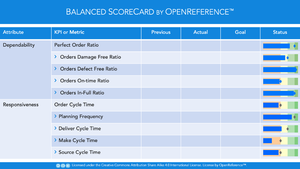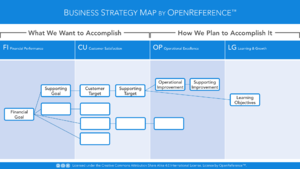Actions
Balanced Scorecard 0 0 Balanced Scorecard,Metrics,Perfomance,Metrics that Matter A tool to manage the internal and/or external performance of a business or supply chain and to monitor the implementation and execution of the business strategy
BSC
Difference between revisions of "BSC"
| (10 intermediate revisions by the same user not shown) | |||
| Line 1: | Line 1: | ||
| − | The {{this}} is a [[Term]] describing the strategic planning and management [[Practice]] to monitor the implementation and execution of the strategy. | + | The {{this}} is a [[Term]] describing the strategic planning and management [[Practice]] to monitor the implementation and execution of the strategy by means of a set of agreed metrics for agreed perspectives. |
| − | Balanced refers to implementing diversity in metrics that prevent the risk of implementing a single-perspective strategy. Generally accepted perspectives required in a {{this}} are: | + | [[File:OR-BSC.png|thumb|Balanced Scorecard example]]Balanced refers to implementing diversity in metrics that prevent the risk of implementing a single-perspective strategy. Generally accepted perspectives required in a {{this}} are: |
| − | * Financial | + | * Financial Performance (FI) |
| − | * Operational Excellence | + | * Operational Excellence (OP) |
| − | * Customer Satisfaction | + | * Customer Satisfaction (CU) |
| − | * | + | * Learning and Growth (LG) |
| − | These perspectives (called [[ | + | ===First Generation View=== |
| + | These perspectives (called [[Attribute]]s in {{OR}}) are a first generation view of the {{this}}. Each perspective is measured by one or more [[Metric]]s. For each [[Metric]] the {{this}} has a target value. | ||
| + | ===Second Generation View=== | ||
| + | [[File:OR-BSM.png|thumb|Business Strategy Map template]]The second generation adds the Strategy Map concept. The Strategy Map enables the representation of cause and effect between objectives and outcomes. | ||
| − | + | ===Third Generation View=== | |
| − | + | The third generation adds a Vision Statement, definitions for strategic objectives to the second generation {{this}}. A third generation view consists of: | |
| − | The third generation adds a Vision Statement, definitions for strategic objectives to the second generation {{this}}: | ||
* [[t:BSC-VS]] | * [[t:BSC-VS]] | ||
| − | * [[t: | + | * [[t:BSM]] |
* Definitions for [[t:BSC-SO|Strategic Objectives]] | * Definitions for [[t:BSC-SO|Strategic Objectives]] | ||
* Definitions and targets for [[Metric]]s | * Definitions and targets for [[Metric]]s | ||
| Line 23: | Line 25: | ||
<ins> | <ins> | ||
[[Link::sc:A1]] | [[Link::sc:A1]] | ||
| + | [[Link::sc:A109]] | ||
| + | [[Link::sc:S006]] | ||
[[Link::t:GSC1]] | [[Link::t:GSC1]] | ||
</ins> | </ins> | ||
| Line 28: | Line 32: | ||
|name=Balanced Scorecard | |name=Balanced Scorecard | ||
|level=0 | |level=0 | ||
| + | |sort=0 | ||
|parent= | |parent= | ||
|keywords=Balanced Scorecard,Metrics,Perfomance,Metrics that Matter | |keywords=Balanced Scorecard,Metrics,Perfomance,Metrics that Matter | ||
| − | |description= | + | |description=A tool to manage the internal and/or external performance of a business or supply chain and to monitor the implementation and execution of the business strategy |
}} | }} | ||
[[Category:Term]][[Category:Practice]] | [[Category:Term]][[Category:Practice]] | ||
Latest revision as of 17:55, 8 December 2021
The Balanced Scorecard is a Term describing the strategic planning and management Practice to monitor the implementation and execution of the strategy by means of a set of agreed metrics for agreed perspectives.
Balanced refers to implementing diversity in metrics that prevent the risk of implementing a single-perspective strategy. Generally accepted perspectives required in a Balanced Scorecard are:- Financial Performance (FI)
- Operational Excellence (OP)
- Customer Satisfaction (CU)
- Learning and Growth (LG)
Contents
First Generation View
These perspectives (called Attributes in OpenReference) are a first generation view of the Balanced Scorecard. Each perspective is measured by one or more Metrics. For each Metric the Balanced Scorecard has a target value.
Second Generation View
The second generation adds the Strategy Map concept. The Strategy Map enables the representation of cause and effect between objectives and outcomes.Third Generation View
The third generation adds a Vision Statement, definitions for strategic objectives to the second generation Balanced Scorecard. A third generation view consists of:
- Vision Statement
- Business Strategy Map
- Definitions for Strategic Objectives
- Definitions and targets for Metrics
See also: The Balanced ScorecardDiscuss Contract Custom Solution
Use Cases
Notes
- ↑ R.S. Kaplan & D.P. Norton: The Balanced Scorecard, Harvard Business Review Press
Align Strategy Define Scorecard Negotiate Discuss Contract Custom Solution
Community Importance Rating:

